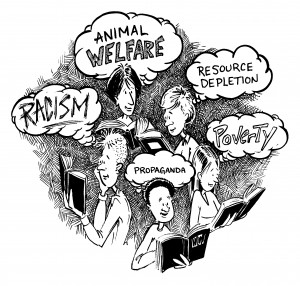Social Justice and Language Arts

Originally appears in the Winter 2007 issue
High school can be a time of extreme complexity and anxiety for many of the students who traverse our halls and campuses. It is a time when teens are navigating relationships with friends and family, worrying about appearances and grades, coming to terms with their changing bodies, learning to drive, and in some cases getting that first paying job. However, it is also the time when young people are developing a moral compass, falling in love with new ideas, overtly challenging perceptions, and in many instances shirking the status quo for a new brand of lifestyle and identity. At this point in their lives, teens are truly starting to think for themselves and to expand their radius of inquiry beyond home and school to social and environmental issues in the wider world.
Educators who wish to teach about these larger issues often find themselves on the philosophical and political fringe, and may even ask themselves whether they are taking advantage of students by introducing ideas that in some way validate their own world view. However, clean water and air, human rights, animal protection, and problems of world hunger, racism, sexism, and homophobia are not partisan issues. These are the concerns of our era and will not find resolution unless our youth are educated and empowered toward that end. If we avoid these topics in high school in the belief that our students will be introduced to them in college or later in life, we are being naïve and irresponsible. It’s because we aren’t teaching our youth about these issues that we continue to see racism, sexism, speciesism, and alarming rates of environmental destruction.
Of the various high school disciplines, it is the language arts curriculum that typically extends itself most readily to these very real and serious subjects, and with good reason. Finding an author’s purpose and discovering what comment on life an author is making are at the heart of studying literature, poetry, essays, and speeches. This puts the language arts teacher in an excellent position to help students explore these issues. Whereas math and science teachers find themselves teaching about how things work in an objective environment, English teachers are constantly immersed in exploring the subjective ideas that are central to who we are and what we believe. This article looks at some of the many ways of extending issues of social justice into the language arts curriculum through literature, poetry, expository texts, and writing.
This content is restricted to subscribers only.
If you are not yet a subscriber, please consider taking out a subscription here.
If you are an existing subscriber, kindly log in or contact us at info@greenteacher.com for more information.





